Note: This tutorial contains affiliate links, but all opinions are 100% my own.
Create a stylish way to store outdoor décor with this slatted deck box. While creating the louvered look may seem complicated, I’m here to tell you, it’s as simple as tilting the slats. Even better, assembly requires little more than a saw, drill, and a Kreg Jig. I recently just switched from the Kreg Jig R3 to the K4 (check out my video about the K4), but you can use either.
GIVEAWAY ALERT: I’m teaming up with Kreg Jig to give a Kreg Jig K4 Masters System to one lucky Build Basic Subscriber! Contest ends June 11th, 2015. Click HERE to learn more!! GIVEAWAY UPDATE: This Contest Has Ended.
Cost: $120 (for cedar, but you could select a less expensive option)
Time: 6 hours
Difficulty: Easy. The faux louvers may look difficult, but tilting the slats is actually very simple.
(4) 2 x 2 x 3′ Balusters – to make the Legs and Dividers
(21) 1 x 3 x 8′ Boards – to make the Slats, Rails, and Floor Boards
(1) 1 x 2 x 8′ Board – to make the Cleats
1 ¼ inch Kreg Jig Pocket Hole Screws
1 ¼ inch Wood Screws to attach the Cleats
Wood Glue
(3) Hinges
Lid Support Hinge
2 x 2 Legs – 4 @ 20 inches
2 x 2 Stiles – 2 @ Cut to Size
1 x 3 Rails (Front and Back) – 6 @ 45½ inches
1 x 3 Rails (Sides) – 8 @ 16¼ inches
1 x 3 Slats (Front and Back) – 20 @ 22 inches
1 x 3 Slats (Sides) – 10 @ 16¼ inches
1 x 2 Cleats – 2 @ 45½ inches
1 x 3 Floor Boards – 18 @ 17¾ inches
1 x 3 Lid (Front and Back) – 2 @ 50 inches
1 x 3 Lid (Sides) – 2 @ 15 inches
1 x 3 Lid (Interior) – 6 @ 45 inches
Steps
1. Cut the Parts
Using the cut list above, cut the 2 x2 legs and 1 x 3 boards to length.
 2. Prep the Slats
2. Prep the Slats
Using a Kreg Jig, drill two pocket holes in the ends of each of the Rails and Slats.
Tip: Check out my new tutorial on How to use Kreg Jig’s K4 featured in this tutorial.

3. Position the First Slat
Mark a line ½ inch from the face of the Front/Right Leg. Make a second mark 2½ inches from the board’s top edge. Now position the end of a 22-inch-long Slat on the Leg, as shown, so that its top edge rests on the crosshair of the two lines, and the bottom edge tilts forward flush with the front edge of the Leg.

4. Attach the First Slat
Using a Kreg Right Angle Clamp, secure the Slat in place on the Leg. Using a drill/driver, drive 1¼-inch pocket-hole screws through the holes in the Slats and into the Leg.

5. Continue Attaching the Slats
Place the next Slat below the first, angling it in the same way. Place the clamp in the pocket hole to hold the Slat in place. Secure the Slat with screws. Secure three additional Slats, for a total of five tilted Slats. Repeat this process to assemble the left side of the box’s front.

6. Measure and Cut the Divider
Place a 2 x 2 against the unattached ends of the 1×3’s. Mark the top and bottom of the “panel” on the 2 x 2 Divider, and then cut it to length.

7. Attach the Divider
Mark the ½ inch recess line on the divider. Clamp a set of Slats against it, and then secure them with pocket-hole screws.

8. Assemble the Panels
Lay the assembled slatted panels face down on the work surface. Clamp the Divider to the table. Drive pocket-hole screws through the Slats in the unattached panel to secure it to the Divider between them.

9. Prep the Rails
Dry fit the doubled-up upper Rail and the lower Rail between the Legs. Mark the location of the Divider on each Rail. Next, drill pocket holes through the thickness of each board so that the screws will run through the Rails and into the ends of the Divider.

10. Install the Rails
Position the face of the top Rail flush with top edge and face of the Leg. Secure the Rail to each leg using pocket-hole screws.

11. Attach the Rail to the Divider
Drive screws through the Rail and into the Divider.

12. Double-up the Top Rail
To create a thicker top edge when the box is open, apply a bead of wood glue to the installed Rail, and then lay a second Rail against it. Attach the Rail to both Legs and the Divider. Lastly, install the bottom Rail against the underside of the lowest Slats and flush with the face of the Legs. .

13. Add the Cleat
Apply glue to the backside of the 1 x 2 Cleat, and then position it in place on the bottom Rail. Place a spacer block between the Cleat and the bottom Slat–this spacing will allow the floor slats to set on the Cleats below the Slats and Divider. Drive 1¼-inch wood screws through the cleat and into the Rail to hold the Cleat in place.

14. Add the Side Rails and Slats
Attach the side Rails and Slats to the Legs using 1¼-inch pocket screws. Make sure to keep the top and bottom Rails flush with the face of the Leg, while tilting the 5 slats between them. On the Slats where the clamp won’t reach, clamp the Leg to the table and firmly hold the Slat in place while securing.

15. Assemble and Add the Back Panels
Following Steps 2-13, assemble the back of the box. Mark the ½-inch recess line on backside each Leg. Set the assembled front wall and sides onto the back.

16. Attach the Sides to the Back
One by one, adjust the Slats using the lines on the Legs as a guide, and then screw them into place.

17. Double the Side Rails
Apply glue to the inside of the top and bottom Side Rails. Place a second Rail against each boards, and then screw it to the Legs using pocket-screws.

18. Insert the Floor Boards
Place the Floor Boards into the assembled box.

19. Position the Floor Boards
Rest the ends of each Floor Board on the 1 x 2 Cleats. Angle the Board, and then twist it tightly into place. Once complete, the Slats should set tightly together with little gapping.

20. Layout the Lid Pieces
On a flat surface, lay out the Lid pieces. On the perpendicular boards, look at the end grain of each board and attempt to alternate the direction the boards’ “cup” (moon-shape of the grain).

21. Assemble the First Pieces
Drill pocket holes in the ends of the interior boards and end boards. Drill additional pocket holes along the interior joints every 8-10 inches. Apply glue to the end of each Side Board, and then clamp and screw them to the Front Board.

22. Assemble the Lid Boards
Continue attaching the Interior Boards using clamps, wood glue and 1¼-inch pocket-hole screws. When the Lid is complete, flip the assembly over, and then sand the surface smooth.

23. Attach the Lid
Using a drill/driver, add three hinges to the underside of the lid and to the top edge of the back of the Box. Add additional lid support hinges, if desired.

MORE BUILDING PLANS
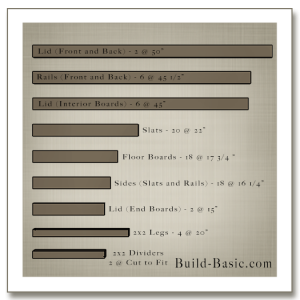
 2. Prep the Slats
2. Prep the Slats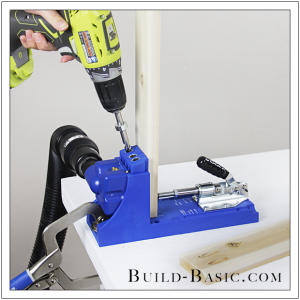
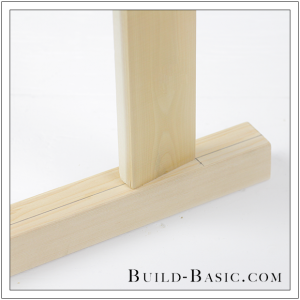
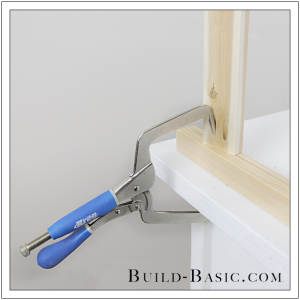
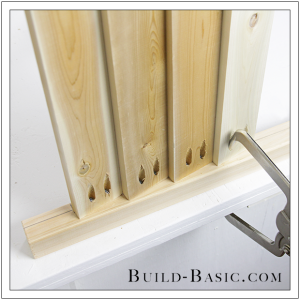
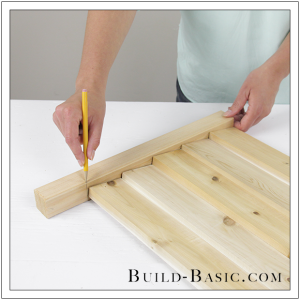
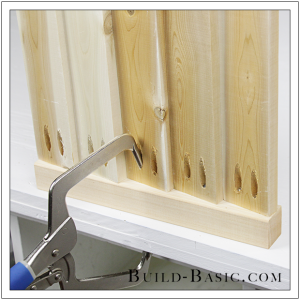
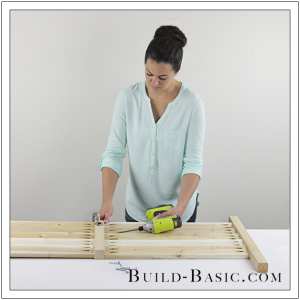
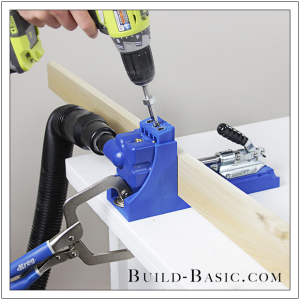
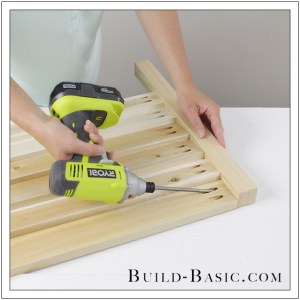
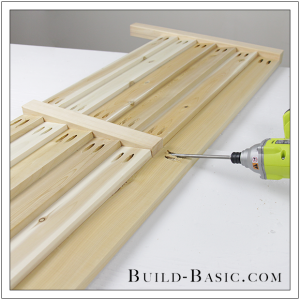
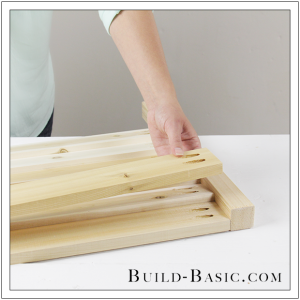
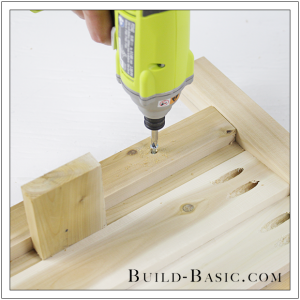
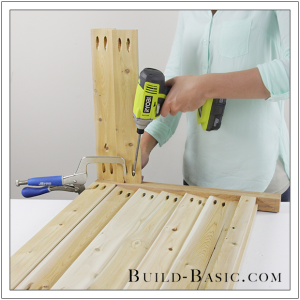
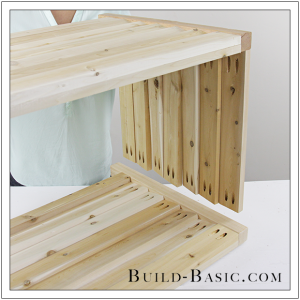
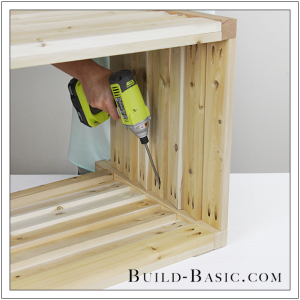
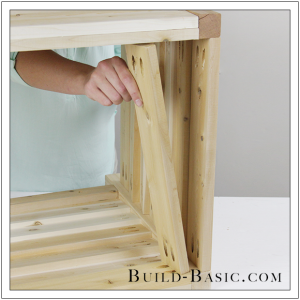
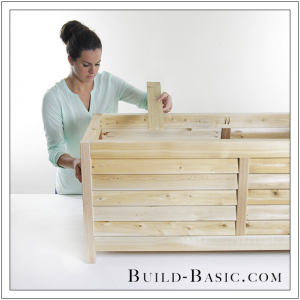
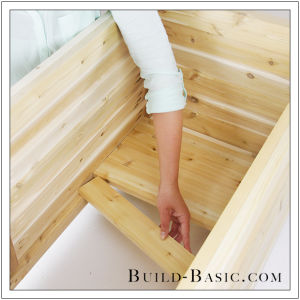
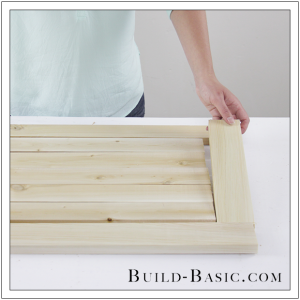
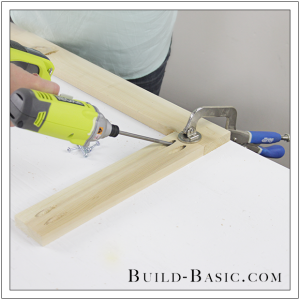
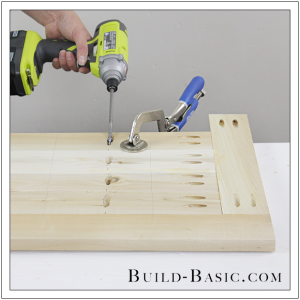
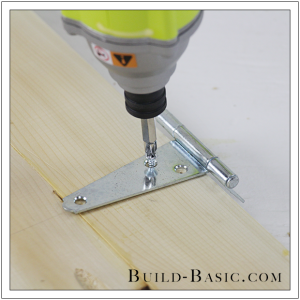





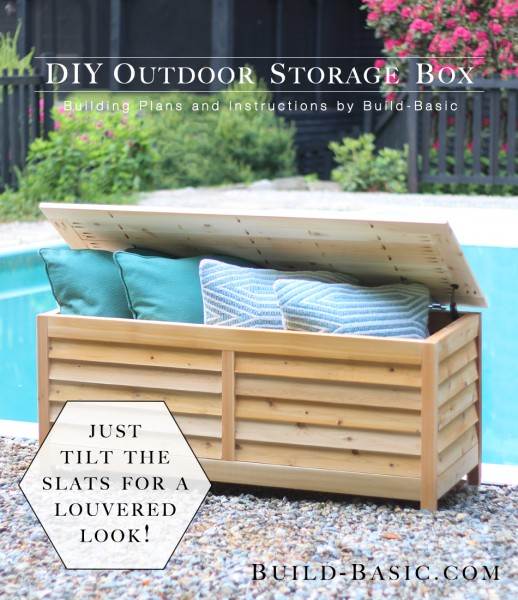
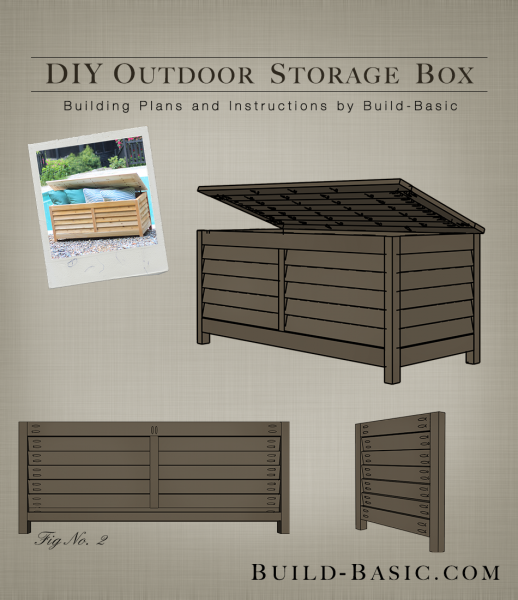


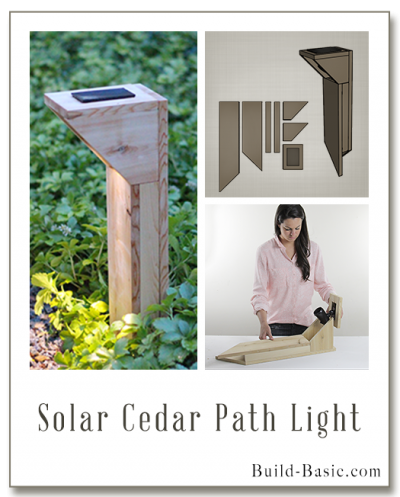
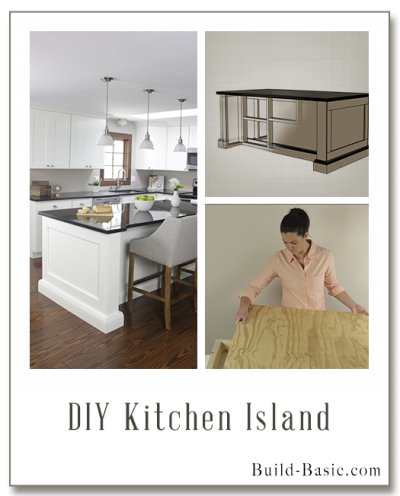
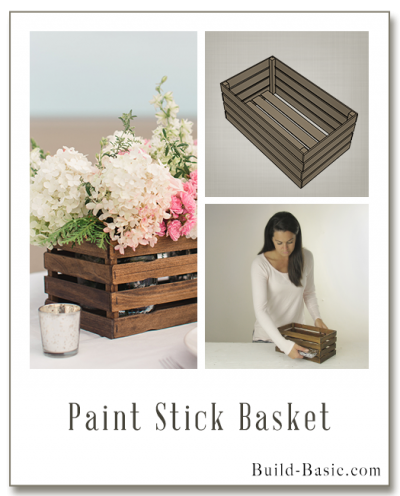
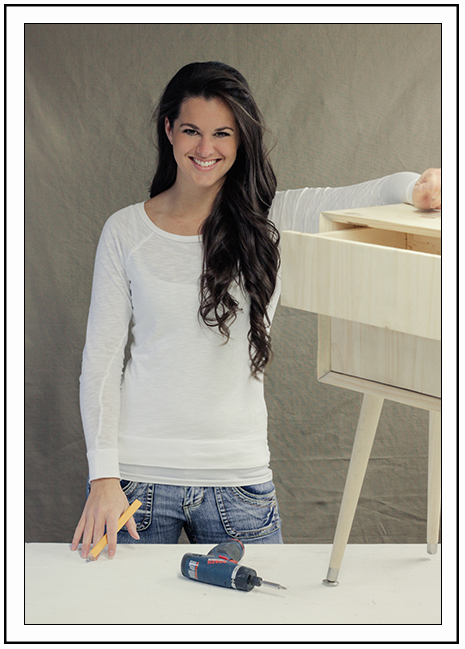





Hollie Thomas
Hi, do you have a PDF for this project? Thank you
Hannah
Do you think this design would be sturdy enough to use as an outdoor storage box that is also a bench? I’m thinking about building some outdoor furniture instead of buying so that I can customise to my space.
Frank Gamboa
Great project!! I just finished up making this box. I ended up doubling the length and adding four inches to the width. Pretty sure I will be asked to make two other ones.
Charles Berkel
Regarding the plan for the outdoor storage box, when you give a dimension of 2 X 2 is this actual or is it 1 1/2 X 1 1/2 ?
When you say 1 X 3 is it 3/4 by 2 1/2 ?
It looks like a lot of screws in the dividers – Do I have to worry about the wood splitting?
I thought about making this with white oak and using actual measurements but think it may end up too heavy. Cedar would be a possibility but would have to use 1″ decking wood glued together to make the 2 X 2 or else plane down a 4 X 4. What would you suggest?
Thank you.
Hamburglar Helper.
This is a bit late in reply, but the dimensions provided are common dimensions (not actual). I would very highly recommend going with cedar or treated pine. The cedar looks nicer but you have to be more careful with your picks. Another piece of advice is that this is longer than a 6 hour project, a lot longer. Just the cuts of wood alone take a while, and you have to make sure your cuts are accurate. If you half ass it, and have cuts that are 1/8th or even 1/16 th of an inch off, things are going to be off square. This isn’t simply a suggestion about aesthetics. For example, when you are assembling the front and back pieces, if you have slats different in size by a little bit, they won’t line up flush with the divider when connecting the leg and divider. Pocket hole screws are a bit unforgiving about this. The result will be a very flimsy front or back panel. Hope this helps.
Art Wilson
I just love your outdoor storage box. I do wish you would have identified the finished dimensions of the demonstrated project.
I would like to build one of these that’s 2.5 x 2.5 x 7 feet but am having difficulty determining what I need and what my cut list would be. (Just bought my first Kreg Jig and love it…I built and installed two drawers).
Any help is appreciated.
Thanks
Arthur (newbie)